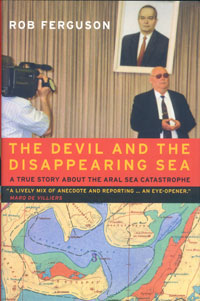
The Devil and the Disappearing Sea: A True Story About the Aral Sea Catastrophe By Rob Ferguson
Hardcover, Raincoast Books, Vancouver, 2003
I've always had a fascination with Central Asia. The region has an amazingly rich history including being integral to the Great Game in the 19th century. I'm also intrigued with the post-Soviet states. Talk about colonialism; these new countries are going to be dealing with the legacy of the USSR for many years to come.
This book, then, immediately grabbed my eye in the used bookstore. This is a memoir written by a Canadian who went to The Aral Sea region in 2000 to lead an environmental awareness campaign about one of the great ecological disasters of our time. The Aral Sea was once the fourth largest inland water body on the planet with about 67,000 square km of lightly salted water. By the end of this century, the water level had dropped 19m, it had lost 80% of it's volume and the salinity increased to 40%.

The tragedy of the Aral Sea is really about cotton. The Soviet Union poured money into the region and constructed massive irrigation projects which removed most of the water from the tributaries to the sea. The Cold War competition with the USA surprisingly also involved cotton production and this was where it was most intensively farmed on the collectives. Post breakup, the newly formed countries surrounding the Aral Sea (Uzbekistan, Kazakhstan, Kyrgyzstan, Tajikistan and Turkmenistan)had no hard currency and continued to produce the cotton that ruined the land and drained the rivers.
Rob Ferguson writes a book that is mainly his recollections of the time he spent in the area but also has fairly good history and context. His project is stymied at every turn by corruption, Russian mafia, old Soviet apparatchiks, and a general anti-Western mindset found in the Central Asian psyche. It's a terrifying and tragic story that for the most part is well told. The author, as the book goes on, gets caught up in the machinations of the NGO world and the book begins to lose touch with the larger, more interesting, story. He has an eye for detail in his travels around the various countries but often his writing skill is unable to keep up with the color of the moment.
A very interesting book about a severely under-exposed area of the world.


2 comments:
Nice post (like the image/word layout). Man, another depressing story about man destroying shit.
Wow, this is good evicence that people are short-sighted. This is a really good review. Nice image of the stranded ships.
Post a Comment